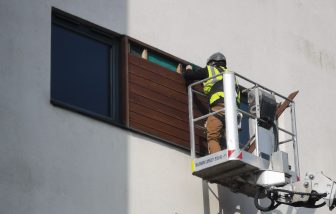
Britain is braced for the hottest day ever today when the mercury could exceed 40C.
The sweltering conditions would beat the UK’s previous record of 38.7C measured at Cambridge Botanic Garden in July 2019.
With heatwaves become more frequent and extreme, Zurich UK is warning that a surge in office-to-residential conversions could lead to a rise in homes suffering from overheating, with many unfit for future climate conditions.
Planning figures show applications to convert offices into residential units increased in England from 1,765 in 2020 to 2,121 last year – a jump of 20%, as developers snap up blocks left empty by the pandemic.
But there are concerns poorly designed conversions, which lack appropriate ventilation and shading, could create homes in danger of overheating in more frequent and intense heatwaves.
The danger is greatest in tiny, self-contained bedsits and studio type flats, with single aspect windows. With many offices located in heavily built-up areas, the blocks are also more exposed to the ‘urban heat island’ effect, where temperatures are hotter than outlying areas.
Last year, the Climate Change Committee (CCC) warned that overheating in homes is among the eight top climate change risks for people in the UK. A Loughborough University study found 4.6 million homes in England suffer from overheating, while government survey data published earlier this month suggests it affects nearly 8% of homes.
 Since 2015, more than 73,500 residential units have been developed from former office blocks under planning rules introduced to cut down on red tape. However, an independent report commissioned by the government concluded so-called permitted development rules create “worse quality” residential environments.
Since 2015, more than 73,500 residential units have been developed from former office blocks under planning rules introduced to cut down on red tape. However, an independent report commissioned by the government concluded so-called permitted development rules create “worse quality” residential environments.
As well as risks posed by climate change, Zurich sees a high volume of escape-of-water claims from office-to-residential conversions, with one of most frequent causes being the failure of plumbing systems not originally designed to service hundreds of domestic kitchens and bathrooms.
Paul Redington, Zurich’s major loss property claims manager, said: “The number of office-to-residential conversions has continued to rise, as new workplace flexibility leaves office blocks empty.
“While many conversions will be well-designed and include cooling features, this is not always the case. Poor quality conversions are at serious risk of overheating, and suffer from other issues, such as escape of water.
“Developers needs to ensure that retrofitted buildings are designed with increased ventilation and shading to keep temperatures down. Building more affordable housing is a priority but we must avoid creating swathes of homes unfit for a rapidly warming world.”
SOURCE: Property Industry Eye | JULY 18, 2022 | MARC DA SILVA


 Estate Agents
Estate Agents
Comments